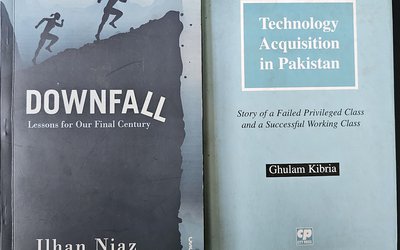Reason usually means rational intellect or the logical faculty of mind which deals with the chain of events leading from cause to effect. It constitutes the sovereign faculty of mind. “Reason is undoubtedly the highest developed faculty of man. It is the sovereign, the governing and self-governing faculty in the complexities of our human existence. It is concerned only with the particular action and does not look at other actions and forces” - Sri Aurobindo. Reason is thus limited but it finds justification in what it does. It is then subject to our interests such as needs, prejudices, opinions etc., each of which is imprinted in our mind as preferred idea. But preferred ideas are the ideas we have cast into the mould of some particular ideas that have particular meaning. In other words, we deny or suppress all other ideas that are not useful for pursuing the particular idea. This makes our life limited because the preferred ideas are themselves limited.
Reason does upgrade itself through a chain of thoughts and experiences in an ascending order. So it is an unavoidable companion in our search of truth, but the reality is neither thought nor experience gained through thoughts. The reality can be had through wisdom of knowledge, but the transition from the one to the other is not simple evolution but an evolutionary leap; so one cannot make the final jump on the strength of reason alone. The journey ahead is taken up by our spiritual nature that pushes us towards the highest. But one has to understand that the common understanding that the relation between reason and spirit is antagonistic, hostile and that they have no point of contact is not correct. The fact is: there is a gap between the domain of reason and what lies above it. Since the reality is beyond the reach of simple intellectual comprehension, reason must be transcended by a combination of philosophical vision and religious insight.
It is true that the intellectual reason is neither the only nor the best means of knowledge, although it is most convincing. Other instruments of knowledge such as sensations, feelings, imaginations, intuitions are also important but each of them is concerned only with the particular action and does not look at other actions and force. For example, feelings exist for themselves and come to the surface without our asking. Although they are not rational and self-coordinating, they represent a force that can influence the way we behave, and make us more mature. Therefore, none of them is to be excluded; they have to be lifted up out of their imperfection and made the instrument of light, power and joy. For example, it is often through feelings that reason sees its limitations and grows to its higher levels. Intellectual reason is upgraded by intuition as it cannot go beyond its limit. Intellectual reason is critical rather than creative so it has to be surpassed and left behind when it leads to dead end. This we do when we are creative because reason can construct but cannot create.
The quality of all creation is best when it is least touched by intellectuality. A poet creates his poetry best when he frees himself from the burden of thinking or weaving his words into poetry. The beauty of his poetry flows out of the inner stillness, out of no thoughts. “The creation of beauty in poetry and arts does not fall within the sovereignty or even within the sphere of the intellect/reason” - Sri Aurobindo. The intellect is not the poet, nor the creator. But whatever the limitations of these other faculties “they still are the hidden actions of the universal Knowledge-Will”- Sri Aurobindo. But the problem is that they are beyond the reach of intellectual comprehension. While reason can turn upon itself, can stand back from itself and analyze itself and, most importantly, disengage itself from its work, none of the other faculties can do this, although these other faculties are much subtler and deeper than those of physical nature. There is, therefore, a greater and larger truth than reason.
The faculty of reason has been used most proficiently by science, and science has made our life more comfortable and enjoyable materially. But reason/science, philosophy and religion are interrelated in such a way that each of them becomes more effective when it works in conjunction with the other two. Reason is best helped out when philosophy and religion work together and transcend reason firstly because philosophy in the East is spiritual. We have to recognize that science, philosophy and religion are all evolving because of the synergy associated with their interrelationship, although the essence of religion may not change as fast. Now a scientist can no longer observe the phenomena without taking part in the unfolding of that phenomenon. He has to be the subject as well as the object of his study, and when he becomes the subject of his study, for example science, he will use science as the science for understanding. Science is no longer value-free as was considered a few centuries ago. Science can no longer work without taking recourse to philosophy, to intuition and even to feeling. As rightly said by Einstein “science can only complete itself by becoming philosophy”. Science has now to transcend its rational boundary and extended its boundary well into the sphere of intuition and philosophic wisdom.
The realization that subject and the object cannot be separated from one another widened the scope both of religion and philosophy. The philosophers and scientists, starting with the eighteenth and nineteenth century philosophers who were somehow influenced by Eastern thought, realized that they cannot do away with subjective experiences, - which the previous scientists and philosophers termed as mere subjective impressions. This can be considered as an important paradigm shift in the history of Western science and philosophy. While science is not anti-religious in the East, it is not necessarily so in the West as shown by the history of the crusaders. One of the reasons is that religion in the East is not based entirely on faith alone. It depends on the dynamic relationship between faith and the quality of lived experience which does not depend on rational analysis alone but more on the internal experience gained through direct experience which includes intuitive experiences as well as religious disposition. But experience shows that faith is cumulative and so is the relationship between faith and personal experience. While philosophers in the East are also spiritual, philosophers in the West have tried to explain the phenomena more from a rationalistic point of view. But as a result of inter-mingling of Eastern and Western thoughts, particularly in matters related to the role of intuition, Western philosophers, Kant, Hegel, Schopenhauer and a few others made significant contribution in making clear the role of reason, philosophy and religion. Kant, for example, made a clear distinction between the phenomenon and the thing-in-itself or the ultimate truth, but most of the Western philosophers thought that nobody can discover the ultimate truth and that nobody is likely to discover it because of the inherent human limitations, and thus stopped short of realizing the Truth, and could not tell how to move from idea to action.
According to the Eastern philosophy, a stream of thought originates from different sources and the problem that seems almost insurmountable in the West finds a deceptively easy answer in the East without being caged in one’s own words and without straining one’s mind too far. Knowledge flows freely and spontaneously from within; from the higher to the lower. As said by Radhakrishnan: The whole course of Hindu philosophy is a continuous affirmation of the truth that insight into reality does not come through analytical intellect, though it is accessible to the human mind in its integrality.
Note that the greatest achievements we have made are not through science and technology, but more through the achievements made in the field of art, culture, sculpture, aesthetics, philosophy and religion. We have achieved unprecedented achievements in the field of material life, in the field of science and technology, but the achievements made in the field of inner development are more important and far reaching. Although science has proved to be an efficient tool and guide for our outer existence, it is an insufficient guide for our existence as soul because it is basically scientific/rationalistic, economic and utilitarian which are exactly the attributes required for material existence. The life of reason and intellect thus stands between our material existence and inner reality because we do not realize that we have to leave the intellect behind as we leave the boat behind once we cross the river. The limitations of reason become obvious when it is confronted with the truths of our psychological experiences which are beyond the reach of rational analysis but are within the grasp of higher faculties i.e. insight, intuition and intuitive discernment. Psychological experiences are as real as any other mundane experience, but the problem is that we do not understand the significance of psychological experience unless we assimilate them internally, but when we do it we transcend the rationalistic intellectual reason. This leads to psychological transformation of our life which materializes when we transcend the limitations of our mental attributes and use their positive aspects to enhance the quality of our inner life.
Perhaps the most difficult task reason has to accomplish is to differentiate between the Finite and the Infinite as illustrated by Plotinus. M. J. Eastcott, too has expressed the difficulty in a similar vein:
“You ask how we can know the Infinite. I answer not by reason. It is the office of reason to distinguish and define. The Infinite, therefore, cannot be ranked among its objects. You can only apprehend the Infinite by a faculty superior to reason, by entering into a state in which you are no longer your finite self – in which the divine essence is communicated to you. This is ecstasy. It is the liberation of your mind from its finite consciousness. Like only can comprehend like; when you thus cease to be finite you become one with the Infinite.
The inmost essence of religion is the search for God and finding God. It is finding the intimate relationship between man and God, and be at one with God. It is the journey from matter to spirit. In the East, philosophy is necessarily spiritual; it elevates us above the material world and makes us superior to circumstances, but it always works in collaboration with intellectual reason, because it proceeds from facts of experience. It acts as the connecting link between the rational mind and its spiritual content. Philosophy and spirituality are interrelated in a way as are theory and practice. While philosophy provides an approach to spiritual realization, it is not the ultimate realization. Therefore, it does not, by itself, provide the true knowledge. It cannot take us there, but it can show us the way. As said by Radhakrishnan: “Philosophy is only the lover of wisdom and not its possessor. It is not the end of the voyage that matters, but the voyage itself. To travel is a better thing than to arrive”.
This limitation of philosophy has also been highlighted by Sri Aurobindo: “Even the highest philosophizing cannot give a true inner knowledge, it is not the spiritual light, does not open the gates of experience. All it can do is to address the consciousness of man through his intellect and, when it has done, to say, “I have tried to give you the truth in form and system which will make it intelligible and possible to you; if you are intellectually convinced or attracted, you can now seek the real knowledge, but you must seek it by other means which are beyond my province”. In fact, what philosophers do is to explain the thing through words, ideas, symbols, images etc, but none of them represents the reality. The objective is to be at one with the reality which is beyond the scope of philosophy. Religion has then to proceed ahead without the help of philosophy.
The truth embodied in genuine psychological and/or religious experiences is thus not a mere philosophical construct or a psychological solace. Spiritual philosophy shows the path, but one has to walk along the path individually. But “the Self cannot be realized except by those whom the Self chooses” –Radhakrishnan. Truth is often realized by way of revelation or through illuminations which can happen singly or through a combination of revelations, insights, intuitions and/or intuitive discernment. Of these, revelations constitute a special type of grace from above. Although revelations are not totally unconnected with insights and intuition, they help us more to see the truth rather than think about it. The resulting realization makes it easier for us to comprehend the potential as beyond intellectual comprehension.
Our upward journey proceeds first by the laws of reason. Philosophy leads us further along the path but the knowledge so gained is not the whole truth. Intellectual illumination, revelations, insights and intuitions are the faculties that help us to move on and step into the territory of inner experience. The spiritual journey moves ahead from reason to intuition and then to higher levels of our existence through transformation of our mental attributes i.e. emotions, feelings, opinions, prejudices etc. Religion comes to our aid as it is only through the act of living into life that we can fully utilize the positive and negative aspects of our mental attributes; transcend them when needed, and know their spiritual aspects, and finally use them for the greater good. It is the intimate relation between philosophy and religion that makes both of them alive, dynamic and real, -Radhakrishnan.
Both philosophy and religion can transcend reason, but the faculty of reason needs special treatment. Reason is the sovereign faculty for our material existence related to our vital and mental life, but it often becomes a hurdle for our spiritual existence which cannot be limited to the satisfaction of the gross needs or to the vital urge of Nature. The purpose of life should be founded on the spiritual force which is beyond the grasp of rational mentality.
It is now universally acknowledged that human progress towards its final destination i.e. Sat-Chit-Ananda is a must, and is in progress. This progression is often characterized as integration of body, mind and spirit or of science, philosophy and religion. Of these, philosophy and religion constitute the most important means of this progression, but we cannot leave out its base i.e. science by which we often mean the reasoning intellect. From this point of view it seems most appropriate to conclude this chapter with the wordings of Sri Aurobindo. Science takes possession of the measures and utilities of force; rational philosophy pursues reason to its last subtleties; but inspired philosophy and religion can seize hold of the highest secret, uttamam rahasyam.

Prof. Dr. Akal Bahadur Singh
Prof. Dr. Singh was one of the founding Pragya in the old pre-1990 RONAST. Recently he has been spending much of his time thinking about the relationship between science and spirituality.
- Insights And Inspirations
- Oct 01, 2023
- Reason, Understanding And Knowledge
- Jul 25, 2023
- Ideas, Actions And Experiences
- Sep 07, 2022
- Unity In Diversity
- Aug 16, 2022
- Pleasure, Happiness And Bliss – The Universal Unity Of Existence
- Jul 26, 2022
















